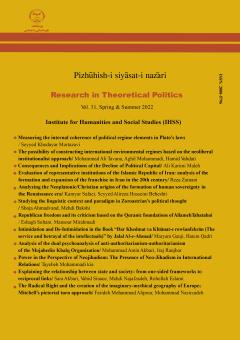Measuring the internal coherence of political regime elements in Plato's laws
Subject Areas : Research in Theoritical Politics
1 - Assistant Professor, Department of Political Science and International Relations, South Tehran Branch, Islamic Azad University, Tehran, Iran.
Keywords: political regime, laws, city association, night council, and law guards. ,
Abstract :
This article examines the internal logic and relation of elements of the existing regime in Essay of the Laws based on their duties and powers, using the theory of "Spragens" and taking into account the crises in the society. The result of the work is to draw a model of the political regime in which we see a combination of the main elements of the two regimes, monarchy and democracy, and its most important goals are to ensure the prosperity and security of the members of the society. In this regime, the institution of the monarchy is at the top, but powerful council institutions such as the Night Council, Law Guards, and the City Council composed of experienced elites are foreseen, which, although they adjust the role of the king in the administration of affairs, in many cases, their duties overlap and paradoxical. In general, the arrangement of the institutions of this regime is such that due to the lack of internal coherence, it deprives the citizens of the possibility of dynamism and fundamental innovation or prosperity, and perpetuates a static and rigid state in various aspects of life. Also, this regime can be seen as a model between two ideal and real societies, which, although it is far from the model of the Republic, its real actualization is also very unlikely.
اسپریگنز، توماس (1377) فهم نظریه¬های سیاسی، ترجمه فرهنگ رجایی، تهران، آگه.
اشتراوس، لئو (1381) فلسفه سیاسی چیست؟، ترجمه فرهنگ رجایی، تهران، علمی و فرهنگی.
---------- (1392) شهر و انسان، ترجمه رسول نمازی، تهران، آگه.
افلاطون (1366) دوره آثار افلاطون (جلد چهارم، قوانین)، ترجمه محمدحسن لطفی، تهران، خوارزمی.
بشیریه، حسین (1396) احیای علوم سیاسی- گفتاری در پیشه سیاستگری، تهران، نشرنی.
بورمان، کارل (1375) افلاطون، ترجمه محمدحسن لطفی، تهران، طرح نو.
عالم، عبدالرحمن (1393) بنیادهای علم سیاست، تهران، نشرنی.
قادری، حاتم، تاجیک، نرگس (1388) «تفسیری از نزاع سقراط و آتن»، فصلنامه تحقیقات فرهنگی، دوره دوم، شماره 6، تابستان.
کاپلستون، فردریک (1375) تاریخ فلسفه یونان و روم، ترجمه سید جلال¬الدین مجتبوی، تهران، سروش.
کلوسکو، جورج (1394) تاریخ فلسفه سیاسی (دوران کلاسیک)، ترجمه خشایار دیهیمی، تهران، نشرنی.
گاتری، دبلیو سی (1377) تاریخ فلسفه یونان، ترجمه حسن فتحی، تهران، فکر روز.
گمپرتس، تئودور (1375) متفکران یونانی، ترجمه محمدحسن لطفی و علیرضا حیدری، تهران، خوارزمی.
یگر، ورنر (1376) پایدیا، ترجمه محمدحسن لطفی، تهران، خوارزمی.
Colaiaco, James A. (2001) Socrates against Athens, London, Routledge.
Janko, Richard (2006) “Socrates: The Free Thinker”, in Sara. Ahbel Rappe&Rachana Kamtekar (eds) ACompanion To Socrates, London, Blackwell.
Habermus, jurgen (1974) Theory and practice, tr: j. Viertel, Boston: Beacon press. Morrow, Glenn (1960) Plato's Cretan City: A Historical Interpretation of the Laws (Princeton, Princeton University press) Lloyd Weinreb, Natural Law and Justice.
------------------- (1998) The Demiurge in politics: The Timaeus and the Laws, plato: Critical Assessments, vol. 4, Edited by Nicholas D. Smith, London and New York: Routledge.
Nails, Debra (2006) The Trial and Death of Socrates, in Sara Ahbel Rappe&Rachana, Kamtekar (eds) A Companion To Socrates, London, Blackwell.
Saunders, Trevor j. (1998) Plato's Later Political Thought, Plato: Critical Assessments, vol. 4, Edited by Nicholas D. Smith, London and New York, Routledge.
Strauss, leo (1975) The argument and action of plato's laws, Chicago and London: the university of Chicago press.


